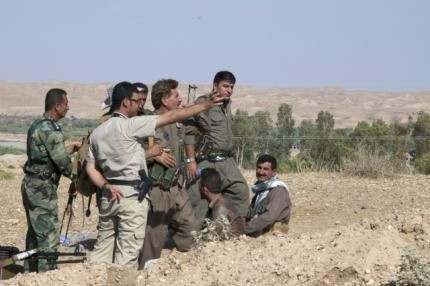Kurds Advance Against Militants With US Air Support

Update 7:30 p.m.: Kurdish officials said their forces forces have largely taken control of the Mosul dam from Islamic State militants, the BBC reported late Sunday.
Original post:
DOHUK Iraq (Reuters) - Kurdish fighters are advancing toward the militant-held city of Mosul, aiming to reverse gains by Islamic State insurgents, witnesses and a Kurdish peshmerga commander said Sunday.
Islamic State militants have seized a large chunk of northern Iraq in recent weeks, grabbing several towns, oilfields and Mosul Dam, possibly giving them the ability to flood cities or cut off water and electricity supplies.
Militants told residents of the dam area to leave, an engineer who works at the site and often comes into contact with the Sunni insurgents said.
The engineer at Mosul Dam, Iraq's biggest, said Islamic State militants told him they were planting roadside bombs along roads leading in and out of the facility, possibly in fear of an attack by Kurdish fighters who have been bolstered by U.S. airstrikes.
Peshmerga spokesman Halgurd Hikmat said U.S. planes -- deployed over Iraq for the first time since the U.S. troop withdrawal in 2011 because of the Islamic State's alarming advances -- had been striking targets near Mosul Dam in the last 24 hours.
"God willing we will regain control of the dam today," he said.
Witnesses said Kurdish forces have recaptured the mainly Christian towns of Batmaiya and Telasqaf, 30 km (18 miles) from Mosul, the closest they have come to the city since Islamic State fighters drove government forces out in June.
The Sunni insurgents have tightened their security checkpoints in Mosul, conducting more intensive inspections of vehicles and identification cards, witnesses said.
The Kurds, who live in a semi-autonomous region in the north of Iraq, have long dreamed of independence from central governments in Baghdad, which oppressed the non-Arab ethnic group for decades under former dictator Saddam Hussein.
Tensions were also high under outgoing Prime Minister Nouri al-Maliki who clashed with them over budgets and oil.
The Kurds since June have capitalized on the chaos in northern Iraq, taking over oilfields in the disputed city of Kirkuk.
But a routing by the Islamic State, which seized heavy weapons from thousands of Iraqi soldiers who fled its onslaught, shattered the myth that the Kurds were highly effective and fearless fighters. Most of them fled.
Newly installed Iraqi Prime Minister Haider Al-Abadi, faces the task of easing Sunni-Shiite tensions that have revived a sectarian civil war and Kurdish independence ambitions financed by oil exports.
German Foreign Minister Frank-Walter Steinmeier has warned against the formation of an independent Kurdish state, saying this would risk further destabilizing the region.
"An independent Kurdish state would ... create new tensions, possibly also with the states neighboring Iraq," Steinmeier said in an interview with Germany's Bild am Sonntag newspaper published Sunday.
"That's why I hope that Iraq's state unity will be preserved."
Proclaiming a caliphate straddling parts of Iraq and Syria, Islamic State militants have swept across northern Iraq, pushing back Kurdish regional forces and driving tens of thousands of Christians and members of the Yazidi religious minority from their homes.
Steinmeier said he was convinced Iraq would be able to stop their advance as long as politicians in Baghdad and the Kurdish regional capital Irbil mobilized all forces and received international support.
Steinmeier, who met with Iraq's new Shiite prime minister in Baghdad Saturday, said the formation of a new government that all regions and religions could identify with "is perhaps the last chance for cohesion in Iraq".
The European Union has allowed individual EU governments to supply arms and ammunition to Iraqi Kurds, provided they have the consent of authorities in Baghdad. Washington is already supplying weapons.
Asked about possible German deliveries, Steinmeier said: "We're not ruling anything out. We're looking at what's possible and doing what is necessary as quickly as possible."
Masoud Barzani, president of Iraqi Kurdistan, reiterated his call for weapons fromGermany and other Western countries in an interview with Bild am Sonntag.
Fears of Islamic State militants - who Iraqi officials say have massacred hundreds of Yazidis - have driven thousands of people to the Kurdish region.
In the town of Dohuk, about 100 Yazidis held demonstrations on Sunday, complaining that they had given up on Iraq and wanted to travel to Turkey but were prevented from doing so by Kurdish security forces.
"They can't protect us. The Islamic State came to our villages and killed hundreds. We don't want to stay in Iraq, they will kill us sooner or later," said Nadia, 20.
"I want America to help me. The peshmerga are not letting us through."
Some are taking matters into their own hands.
Kurdish militants have trained hundreds of Yazidi volunteers at several camps inside Syria to fight Islamic State forces in Iraq, a member of the armed Kurdish YPG and a Reuters photographer who visited a training camp said on Sunday.
The photographer spend Saturday at the training camp at the Serimli military base in Qamishli, northeastern Syria on the border with Iraqi Kurdistan, where he saw 55 Yazidis being
trained to fight.
Dressed in green military fatigues, young and old men were taught how to use assault rifles and rocket-propelled grenades by the Syrian Kurds.
"The Yazidi civilians want to stay in Syria because it is safer, but the volunteers really want to go back to Iraq to fight," he said by phone.
© Copyright Thomson Reuters {{Year}}. All rights reserved.





















